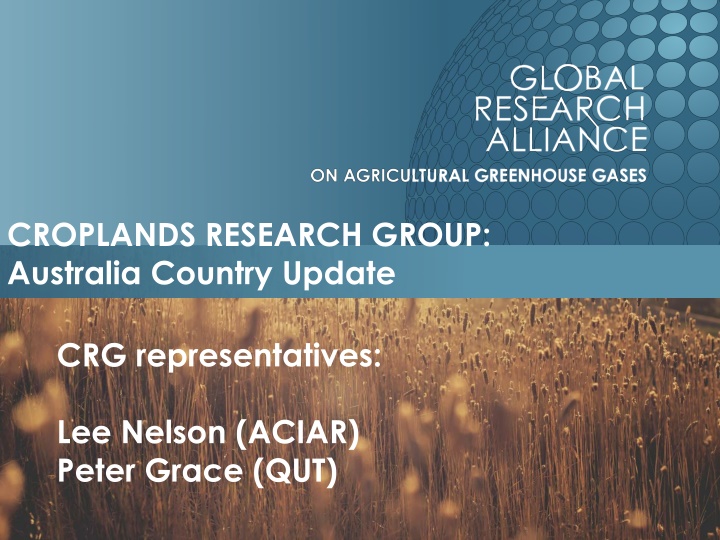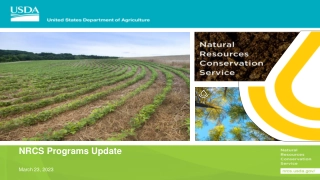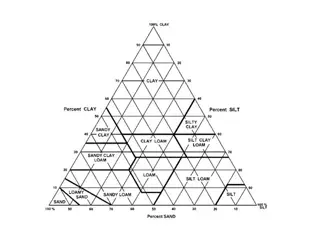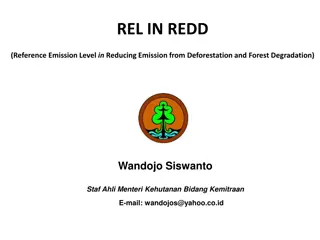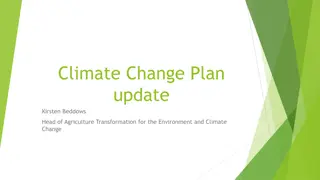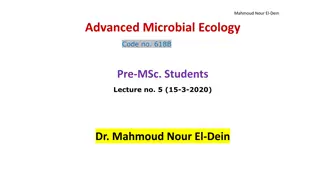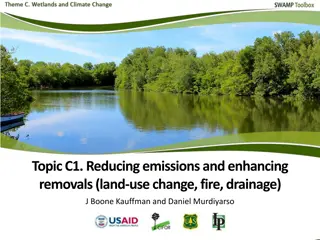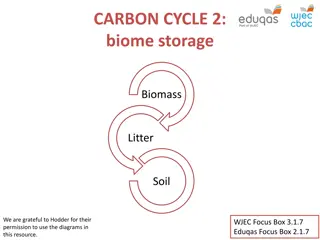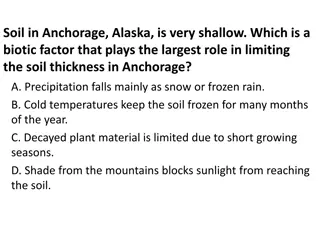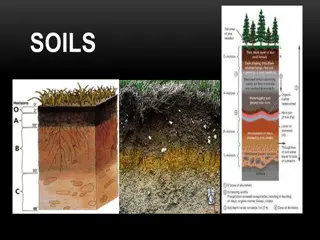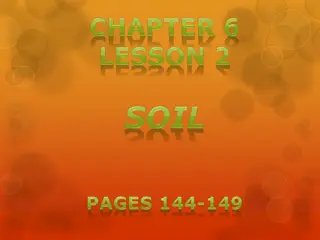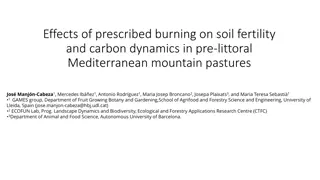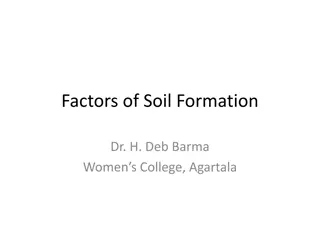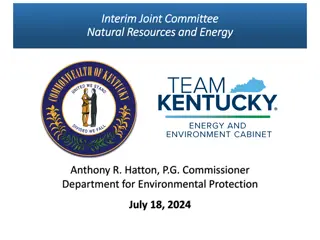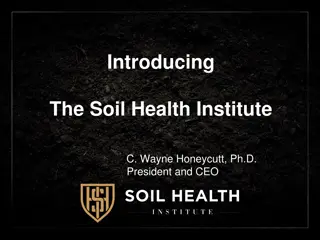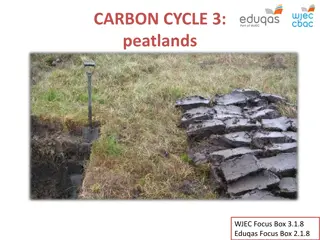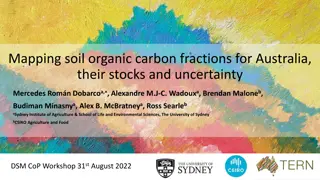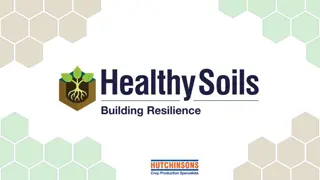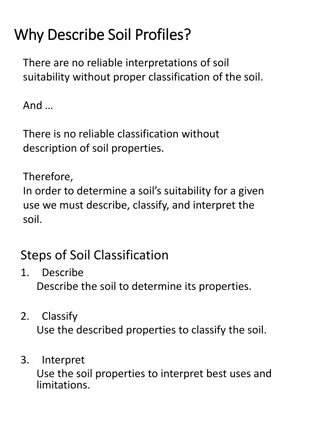Australia Country Update: Soil Carbon Sequestration & Emission Reduction Efforts
Australia's Croplands Research Group is actively involved in various initiatives aimed at reducing energy emissions and enhancing soil health. Key activities include the release of the Technology Investment Roadmap, the upcoming launch of the National Soils Strategy, and the appointment of a National Soils Advocate. Efforts also focus on supporting the agriculture industry's ambition to reach a $100 billion market value by 2030 while prioritizing sustainability. Research priorities center around soil carbon sequestration, N2O emission reduction, and improved N use efficiency in various agricultural sectors. Collaborative projects in Australia and internationally aim to mitigate greenhouse gas emissions and promote sustainable farming practices.
Download Presentation

Please find below an Image/Link to download the presentation.
The content on the website is provided AS IS for your information and personal use only. It may not be sold, licensed, or shared on other websites without obtaining consent from the author.If you encounter any issues during the download, it is possible that the publisher has removed the file from their server.
You are allowed to download the files provided on this website for personal or commercial use, subject to the condition that they are used lawfully. All files are the property of their respective owners.
The content on the website is provided AS IS for your information and personal use only. It may not be sold, licensed, or shared on other websites without obtaining consent from the author.
E N D
Presentation Transcript
CROPLANDS RESEARCH GROUP: Australia Country Update CRG representatives: Lee Nelson (ACIAR) Peter Grace (QUT)
Activities National Release of the Technology Investment Roadmap Aims to reduce energy emissions through investments in hydrogen technology, energy storage, low carbon materials, carbon capture and storage, and soil carbon National Soils Strategy The National Soils Strategy will be launched in June 2021. The Strategy will provide a roadmap for cooperation and communication between the different jurisdictions and industries in Australia, for the ongoing management, research, development and protection of Australia s soils (a high level document with an implementation plan to follow). National Soils Advocate Advocate for soil health across sectors by providing leadership and support on the importance of conserving and improving the condition of soils. The position contributes to the national objective of protecting, restoring and maintaining the health of Australia s natural resources and agricultural security. On a global level, the Advocate s work aims to help address global challenges, including food security, sustainability and climate change. Promote Australia s expertise and capabilities in soil science and research and in land, water and soil management globally.
Activities National Delivering Ag2030 The government is supporting industry s ambition to become a $100b industry by 2030 (the relevance here is that while production needs to increase to achieve this, it cannot be at the expense of sustainability). The Rural Research and Development Corporations (RDCS) the Grains Research and Development Corporation has recently invested with CSIRO to support the nation s grains industry to better measure and reduce its greenhouse gas emissions. The project will provide essential baseline data around the current level of greenhouse emissions, opportunities for mitigation and shape a realistic plan for emission reduction. It will help to facilitate grain growers access to working capital by aligning greenhouse gas emission practices to the requirements of finance institutions and other investors. GRA Council Australia will take up the Chair of the GRA Council at the next annual Council meeting in March 2021 Australia will be working with all research group co-chairs on content to be delivered to the GRA Council early in 2021 Major research group achievement Research group planning
Research and Capability Priorities Soil carbon sequestration, increased N use efficiency and reduced N2O through application of silica to sugar cane soils. Improved modelling of denitrification and N2O emissions from cereals using the National Agricultural Nitrous Oxide Research Program 15N database. Reducing N2O emissions in irrigated tropical horticulture crops in northern Australia using organic amendments (DAWR). Reducing N2O emissions in intensively managed horticulture crops in southern Australia using organic amendments (DAWR). Reducing N2O emissions in dryland cereals crops of northern Australia using organic amendments (DAWR). Reducing N2O emissions in irrigated cotton using organic amendments (DAWR). Increasing N use efficiency and reducing denitrification and N2O emissions from cotton and sugar cane (Sugar Research Australia and Cotton Research & Development Corporation) completed. Agriculture based emission-reduction options to supports NDCs in Vietnam and Fiji (ACIAR) Supporting greenhouse gas mitigation for sustainable farming systems in the Asia-Pacific and East Africa (ACIAR/NZMPI) proposed. Opportunities for emissions avoidance through preserving soil carbon after land clearing in the Asia-Pacific Region: A Scoping Study (ACIAR).
Conservation Agriculture and Sustainable Intensification Systems for Transformational Climate Adaptation and GHG Mitigation in Pacific Island Countries (ACIAR) proposed. $1.7m (co-funding from New Zealand), 2021 to 2025 University of Melbourne, Prof Timothy Reeves Prof Joel Vinayaka, USP Alafia, Samoa Coordinator Dr Lau Viliamu Iese, USP PaCE-SD, Tonga Coordinator delivered via USP Fiji office. Project will test CASI potential to address to some of the priorities for research and development support that were identified in the KJWA Reports 2019 and 2020 - Vulnerability of communities and food production systems; Improved soil health; The correlation between climate change, pest, disease and transboundary / invasive species, and the related impact on food security; Adaptation-mitigation co-benefits through reducing emissions of methane and nitrous oxide; Water management; Improved biodiversity. Transforming Smallholder Food Systems in the Eastern Gangetic Plain (ACIAR) - proposed $4.6m University of Adelaide, Dr Tamara Jackson; 2021 to 2026 in Bangladesh, India, Nepal Sustainable intensification within a framework of nutrition, diversification of crops in the dry winter season, groundwater management and profitable farm incomes. Improve the management of water, energy and food resources in three major Himalayan river basins - the Indus, Ganges and Brahmaputra - crop system diversification and optimisation; zero and minimum till; options for mechanisation; improved water management; access to markets; and gender gaps in technology adoption Please contact Lee Nelson (IRG co-Chair) at ACIAR lee.nelson@aciar.gov.au Peter Grace at pr.grace@qut.edu.au or project leaders directly if you are able to contribute to the above initiatives.
